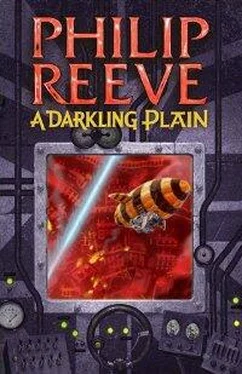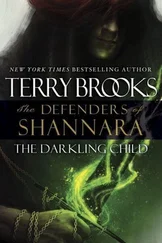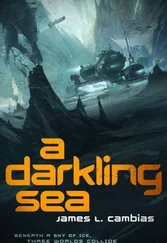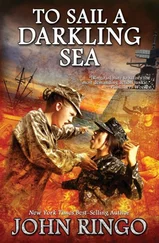“Will he come after us?”
Hester shrugged uneasily. “He fell a long way, Tom. He saved me, and he fell. He might be damaged. He might be dead, and there’s no one to bring him back this time.”
“Just us then,” said Tom, and he took her in his arms again, and kissed her. She smelled just as she had on the night they first kissed, of ash and smoke and her own sharp sweat. He loved her very badly, and he was glad they were alone again, in danger and the wilds, where nothing that she had done mattered.
Not quite alone, of course. He had forgotten Pennyroyal, who knelt up in the bog and said in an irritable, gag-muffled voice, “Do you mind?”
Hester pulled away from Tom reluctantly and nodded toward the house. “This must be the place.”
“We’d better get on with it, then.” Tom took the lightning gun from his shoulder and checked it while Hester tied Pennyroyal’s hands and feet again, reknotting the ends of the cords she’d cut earlier.
“You can’t leave me here, bound and helpless!” Pennyroyal complained through his gag.
“We can’t have you running around free,” said Hester. “You’d sell us out to the Stalker for a handful of copper.”
“But what if you don’t come back?”
“Pray we do,” she suggested.
Tom felt unhappy about leaving the old man behind, but he knew she was right. They were already in enough danger, without a Pennyroyal on the loose behind them.
“How are you proposing to get out of this place?” Pennyroyal howled, as they started to leave, but they had no answer to that, so Hester just tied his gag tighter.
It was hard, rocky country, that valley of Erdene Tezh. Hester liked it. She could hear the grass singing, and smell the earth, and it reminded her of Oak Island. She took Tom’s hand, and they walked together through the gloomy light, looking over their shoulders from time to time at the burning brazier that had been the Jenny Haniver. The ground rose in a steep, grassy slope to a docking pan behind a windbreak of pines. The trees made a steady sighing sound as their needles combed the wind. The same wind boomed against the taut silicone-silk envelope of an air yacht. It was locked and abandoned-looking, but knowing it was there made them feel more hopeful. They moved on, dropping down toward the lake again, toward the causeway.
Hester took the lightning gun from Tom. He was breathing hard, sounding winded. “Stay here with the airship,” she said. “Let me go.”
He shook his head. She touched his face with the tips of her fingers; his mouth, warm in the cold. They started together across the causeway. Tom was slow, but she was glad of that, because it meant that she could draw ahead of him, ready to deal with whatever was waiting for them in that house. There was a creaking noise, but when she swung toward it, it was only plates of ice grinding and grating together at the edge of the lake. Farther out, clear water shone gray and still. She looked ahead again, toward the house.
There was someone standing on the causeway.
“Tom!” she yelled, raising the lightning gun. But she didn’t pull the trigger. It was not a Stalker that stood there watching her. Just a child. A pinched white face and shabby clothes and a lot of filthy hair. She took another few steps, and recognized him. How had he come here? But it didn’t matter. She lowered the gun completely and turned to Tom. “It’s Fishcake!”
Running feet behind her. She heard the boy grunt and, turning, saw the knife flash as he slashed it at her throat. She dropped the lightning gun and grabbed his thin wrist, bending the knife away, twisting his arm until he cried out and let it go. She caught it as it fell and stuffed it through her belt, like a stern teacher confiscating a slingshot. She pushed Fishcake away, and he fell down and started to cry.
“Tom,” said a whispering voice from above them. “Hester. How nice of you to drop in.”
The Stalker. She had been standing in the shadows at the causeway’s end where ten worn stone steps led up to a gate. She came carefully down the steps, limping, the gray light shining faintly on her bronze face.
“She’s my Stalker!” shouted Fishcake. “I found her after you left me behind. She’s been good to me. She’s going to help me kill you!”
Hester looked for the lightning gun, but it had fallen down among the rocks at the waterside. She started to scramble down to fetch it, but steel hands caught her, lifting her, dragging her, gripping her face; a metal arm went across her chest, pulling her back hard against an armored breastplate.
“No!” shouted Tom, running for the fallen gun.
“Please don’t be disagreeable, Tom,” whispered the Stalker, “or I shall break her neck. I could do it very easily. You wouldn’t want that, would you?”
Tom stopped running. He could not speak. He felt as if someone had jammed a rusty skewer through his left armpit, deep into his chest. Pain ran down his arm, too, and up his neck, along his jaw. He fell to his knees, gasping.
“Poor Tom,” the Stalker said. “Your heart. Poor thing.”
Crouched by her feet, Fishcake watched hungrily. “Kill them!” he shouted in his thin, angry voice. “Her first, then him!”
“They were Anna’s friends, Fishcake,” said the Stalker. “But they left me behind!” sobbed Fishcake. “She murdered ’Mora and Gargle! I swore I’d kill her!”
“They will both die soon enough.”
“But I swore it!”
“No,” whispered the Stalker.
Fishcake shouted something and groped for the knife in Hester’s belt, but the Stalker swiped him aside, so hard that he was thrown right off the causeway, down onto the ice, which starred and moaned beneath him but did not give way. Howling with pain and betrayal, Fishcake crept back to the causeway. Sobbing, slithering over the wet stones, he ran away from the house.
The Stalker Fang let Hester go and stooped over Tom. Her steel hand rested on his chest, and her eyes flared as she sensed the erratic, stumbling beats of his heart. “Poor Tom,” she whispered. “Not long now.”
“What’s wrong with him?” asked Hester.
“He’s going to die,” said the Stalker.
“He can’t! Oh, he can’t! Please!”
“It doesn’t matter,” whispered the Stalker. “Soon everyone is going to die.”
She lifted Tom in her arms, and Hester followed her as she carried him up the steps and through her frozen garden, into her tomb of a house.
Pell-mell along stack Seven Sluice, the thick air full of the snattering of dynamos and clang of running repairs down in the district. Up rusty rungs that rose forever, trembling with vibrations as the engines came online. Wren exhausted, scared, hurting, each lungful of air a stabbing ache in the strained muscles of her chest and back, and the only thing that drove her on the fact that Theo was with her now. He reached out sometimes to touch her, encouraging her, but they could not speak, for it was too loud in these dank ladderways, these iron throats that filled with hot breath and angry bellowings as the wounded suburb struggled back to life.
They were soon lost. They wanted to go forward and down, but the tubular streets twisted around on themselves and looped blindly about, leading them up and aft instead. At last they emerged onto a catwalk high above some open square at the heart of the engine district, looking down past lighted windows and giant ducts into a space where a hundred fat brass pistons were pumping up and down in sprays of steam, their speed increasing as Theo and Wren leaned over the handrail to watch.
The handrail trembling; the whole suburb lurching forward. “It’s moving!” shouted Wren, but Theo couldn’t hear her, and there was no need to repeat it for it was quite obvious by then that Harrowbarrow was under way again. No time to repeat it anyway, for just then an engine worker in greasy overalls popped up through a hatchway in the catwalk and stared at them, mouth opening wide as he shouted down to his mates below.
Читать дальше












